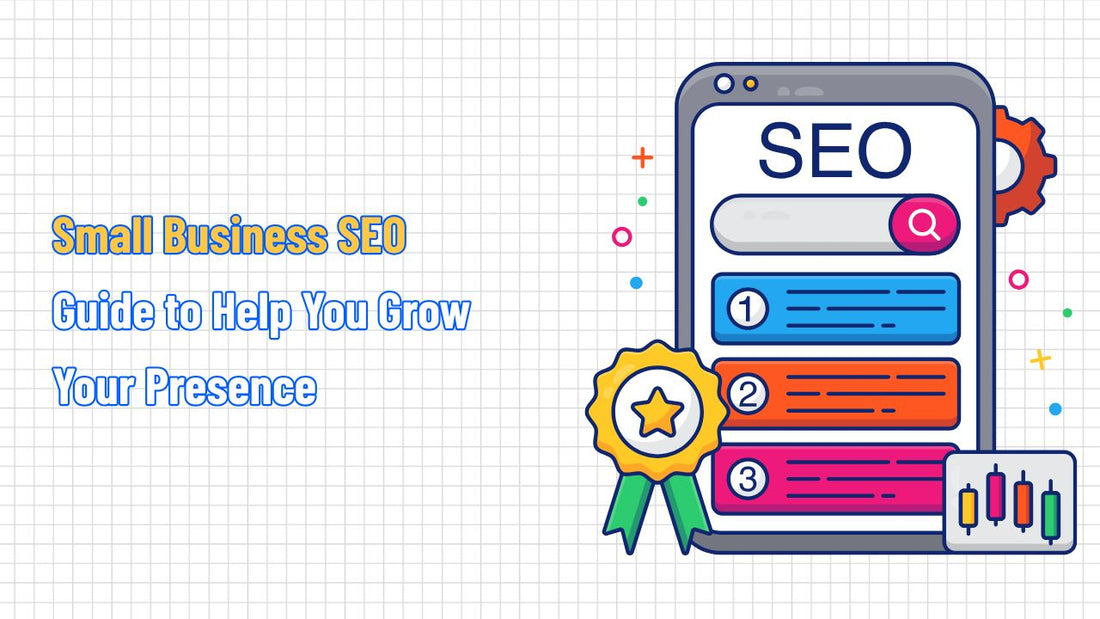Small Business SEO Guide to Help You Grow Your Presence
Table of Contents Hide
In today's digital era, small businesses must strive to overcome fierce competition to establish a strong online presence. At this point, a small business SEO is the key to attracting customers, optimizing costs, and expanding revenue. In this article, NextSky reveals e-commerce solutions and practical SEO tips to help you conquer search results and achieve sustainable growth.
How to small business SEO sustainability with 7 steps
To build an effective SEO strategy for small businesses, you need a systematic approach that seamlessly combines technical optimization, high-quality content creation, and local targeting. Start right away with the following reference steps, including:
1. Define goals and key performance indicators (KPIs)
Before starting SEO for small businesses, clearly define your business's goals. This could be increasing website traffic, improving sales, or attracting more local store customers. The more specific the goals, the more precise the search engine optimization strategy. Below are the key performance indicators (KPIs) you need to track, including:
- Organic traffic: The number of visitors coming from search engines.
- Click-through rate (CTR): The percentage of users who click on your website from search results.
- Conversion rate: The percentage of visitors who perform the desired action (e.g., making a purchase or filling out a contact form).
- Local ranking: Your position in local search results or the Google Map Pack.
- Engagement metrics: Time on page, bounce rate, and pages per session. For example, a small e-commerce business might prioritize conversions from product pages. At the same time, a local service provider could focus on local SEO for small businesses to rank for searches like "service + city."

Read more: What is A Small Business? A Comprehensive Guide to Definition
2. Conduct a comprehensive SEO audit
A deep SEO audit is an essential foundation for building any successful search engine optimization (SEO) strategy for businesses. This process uncovers competitive advantages, lingering limitations, and growth opportunities. Below are the steps to follow.
- Use SEO tools: Tools like Google Analytics, Google Search Console, or SEMrush can reveal current rankings, traffic sources, and technical issues like broken links or slow page speeds.
- On-page SEO audit: Ensure your website has optimized titles, meta descriptions, subheadings (H1, H2), and keyword-rich content.
- Technical SEO evaluation: Check mobile-friendliness, speed, and secure connections (HTTPS). For instance, NextSky's Shopify themes like Glozin and Umino are designed to help small businesses rank higher.
- Local SEO analysis: Verify that your Google Business Profile is complete and consistent with your website's name, address, and phone number (NAP). Regular audits (monthly or quarterly) help you track progress and adjust your small business SEO efforts.
3. Keyword research
Keyword research is the foundational step in search engine optimization for small businesses. This process helps you precisely identify the phrases potential customers use when searching for products or services similar to yours. For effective implementation, you can apply the following methods:
- Understand customer intent: What are your customers searching for? For example, a bakery might target "fresh cakes near me" or "custom birthday cakes [city]."
- Use long-tail keywords: Don't overlook long-tail keywords, like "affordable plumbing services in [city]," as they have less competition but higher conversion potential.
- Incorporate local keywords: For local SEO, combining location-specific phrases, such as "Hanoi coffee shop," helps you reach the right regional customers.
- Leverage tools: Use Google Ads Keyword Planner, Ubersuggest, or AnswerThePublic to find related keywords with good search volume and low competition.
- Analyze competitors: Look at the keywords competitors rank highly for and identify gaps you can exploit. Aim for a list of 10–20 keywords, including primary ones like small business SEO and secondary ones like SEO tips for small businesses or local SEO marketing.

4. Build a content plan
Content is the heart of company SEO. A strategic content plan ensures your website delivers user value and ranks well on Google.
- Identify high-value pages: Focus on pages that drive conversions, like product pages, service descriptions, or landing pages for local services.
- Develop blog content: Blogs are a powerful way to target search engine optimization tips and attract audiences. For example, an article titled "5 Top SEO Tips for Small Businesses" can draw readers and showcase your expertise.
- Incorporate keywords naturally: Use keywords in titles, subheadings, and content, but avoid stuffing. For instance, NextSky's blog might feature an article on "How to Optimize Your Shopify Store for SEO" to align with their expertise.
- Schedule regular updates: Plan to refresh content to keep it current and signal to Google that your site is active. A realistic content plan should fit your resources. If you're a solo entrepreneur, start with one high-quality blog post per month and scale as you grow.

5. Optimize local SEO
Local SEO is crucial in helping small businesses attract customers from the surrounding area. To effectively optimize local SEO marketing, you can apply the following strategies:
- Optimize your Google Business Profile: Ensure NAP (Name, Address, Phone) information is accurate, along with hours of operation, photos, and an engaging description containing location-specific keywords related to your business.
- Encourage customer reviews: Prompt customers to leave reviews to boost credibility and improve search rankings. Remember to respond to all reviews to show engagement and customer care.
- Use local keywords: Incorporate city or neighborhood names into website content, meta descriptions, alt tags, and titles to enhance visibility in local searches.
- Register with reputable directories: Submit your business info to major directories like Yelp, Yellow Pages, and industry-specific platforms. The prerequisite is maintaining absolute NAP consistency to strengthen brand authority and improve local SEO.
- Create local content: Write blog posts about community events, regional partnerships, or case studies to boost local SEO presence.

Regularly update information on Google Business Profile and other directories to keep your presence fresh and appealing to customers.
6. Build a backlink strategy
Backlinks from reputable websites are a key signal for boosting your site's credibility and improving search rankings. To build an effective backlink SEO strategy, follow these steps:
- Form local partnerships: Link up with local businesses, chambers of commerce, or nonprofits for quality links from regional sources.
- Guest posting: Provide valuable articles to reputable industry blogs, including links to your site, to attract new users and build authority.
- Use press releases: Issue releases about new products, services, or community involvement to earn links from local news sites, enhancing your online presence.
- Focus on quality links: Avoid building links from unreliable sources; prioritize high-quality links to maintain credibility and prevent Google penalties.

Helpful tip: Develop a long-term backlink strategy with trusted partners to ensure stability and sustainability for your site.
7. Monitor and update the strategy
SEO isn't a one-time task, it's an ongoing process. To optimize small business SEO effectively, monitor and update key elements regularly. Tools like Google Analytics and Search Console can be used to track performance and make adjustments.
- Update content: Continuously refresh articles, add detailed information, and optimize keywords based on new trends.
- Fix technical issues: Check and resolve SEO-impacting problems, like page load speed or broken links.
- Refine keywords: Adjust keywords based on performance data to ensure you're targeting the right audience and optimizing for the best results.
For example, if a blog post isn't ranking well, revise it with new keywords or additional details to improve its position.
Read more: Small Business Marketing Guide with Effective Tips
Why SEO is important for small businesses
SEO for small businesses is a cost-effective solution that helps you compete with larger companies and reach customers searching for your products or services. Here are the reasons SEO is a key growth factor:
- Increased visibility: Higher rankings in search results help potential customers find you before competitors. For example, appearing in "near me" searches or local map results can drive foot traffic to your store.
- Cost savings on marketing: Unlike paid ads, small business SEO delivers long-term results with minimal maintenance costs, which is ideal for limited budgets.
- Building trust and credibility: High-ranking websites are seen as more trustworthy. Positive reviews and optimized content further enhance your brand's authority.
- Attracting targeted traffic: Local SEO for small businesses targets regional customers who are ready to buy, improving conversion rates.
- Long-term results: A well-executed small business SEO strategy can maintain rankings for months or years with regular updates.
Read more: 10 Best Web Hosting for Small Businesses You Shouldn't Miss
How to manage your small business SEO strategy
Once you've identified the core elements of your SEO strategy, the next step is assigning tasks to team members so each can maximize their strengths.
- Assign keyword research and selection: Accurate keyword selection is crucial for SEO success. If you're handling it solo, conduct keyword research to ensure alignment with your target audience and strategic goals.
- Choose an SEO content lead: Hire a skilled content writer or outsource to create engaging blog posts and landing pages that attract and retain readers on your site longer.
- Optimize directories and business info: Boost online presence by optimizing Google Business and directories with staff or interns. Accurate data with your brand logo creates a professional impression and delivers significant results.
- Oversee and implement the strategy: An SEO expert can handle advanced tactics, from web coding and link building to keyword management. This ensures a comprehensive, long-term, sustainable plan.
Read more: 15 Creative Small Business Packaging Ideas to Stand Out
DIY SEO tips for small businesses
If you're managing SEO for small businesses, apply these simple yet effective tips to optimize your site without significant expenses:
- Improve page load speed: Use Google PageSpeed Insights to speed up loading times, a key factor in boosting search rankings.
- Use SEO plugins: For WordPress, plugins like Yoast or Rank Math make on-page optimization easy.
- Create quality content: Write blogs answering common customer questions like "What is SEO for small businesses?" to attract readers and add content value.
- Leverage social media: Share posts and helpful info on platforms like Instagram or LinkedIn to increase traffic and customer engagement.
- Track competitors: Use Ahrefs to analyze rivals' SEO strategies and refine yours for better results.
SEO for small businesses is a powerful tool to grow your online presence, attract targeted customers, and boost revenue. By focusing on this strategy, you can easily outpace competitors, build long-term credibility, and get closer to dominating search results.











